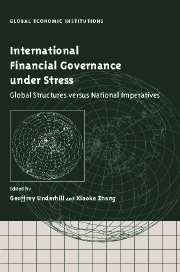Book contents
- Frontmatter
- Contents
- List of figures
- List of tables
- List of contributors
- Acknowledgements
- Introduction: global market integration, financial crises and policy imperatives
- I Financial globalisation and policy responses: concepts and arguments
- II Globalisation, financial crises and national experiences
- III Private interests, private–public interactions and financial policy
- IV Building the new financial architecture: norms, institutions and governance
- Conclusion: towards the good governance of the international financial system
- Index
Introduction: global market integration, financial crises and policy imperatives
Published online by Cambridge University Press: 22 September 2009
- Frontmatter
- Contents
- List of figures
- List of tables
- List of contributors
- Acknowledgements
- Introduction: global market integration, financial crises and policy imperatives
- I Financial globalisation and policy responses: concepts and arguments
- II Globalisation, financial crises and national experiences
- III Private interests, private–public interactions and financial policy
- IV Building the new financial architecture: norms, institutions and governance
- Conclusion: towards the good governance of the international financial system
- Index
Summary
The Asian crisis was the world economy's closest shave since the Latin American debt crisis of the early 1980s and, arguably, since the Great Depression of the 1930s. A combination of currency and financial crises which erupted in east Asia during mid- and late 1997 rapidly developed into a global disturbance, engulfing not only most Asian newly industrialising economies but also Russia, South Africa and some Latin American countries. These systemic disruptions were major, but were not the only examples of financial volatility in recent years. The Asian crisis has been followed by further difficulties in Turkey and Latin America, and at time of writing it remains to be seen what the full effects of 11 September 2001 will be. Indeed, more than seventy financial and monetary crises of different proportions and characteristics have occurred in both developed and developing countries over the past two decades. Large and growing amounts of public money have been committed to tackling the financial crises and their socioeconomic consequences.
A common background to these developments is the intensifying process of global financial liberalisation and integration. Starting with the introduction of floating exchange rates and financial market deregulation from the 1970s onwards, the global monetary and financial system has undergone a radical transformation. Whereas national governments were once effective at shaping socioeconomic policies and development strategies in line with the imperatives of domestic political stability and legitimacy, there is now an increasingly market-oriented and integrated global system.
- Type
- Chapter
- Information
- International Financial Governance under StressGlobal Structures versus National Imperatives, pp. 1 - 18Publisher: Cambridge University PressPrint publication year: 2003

